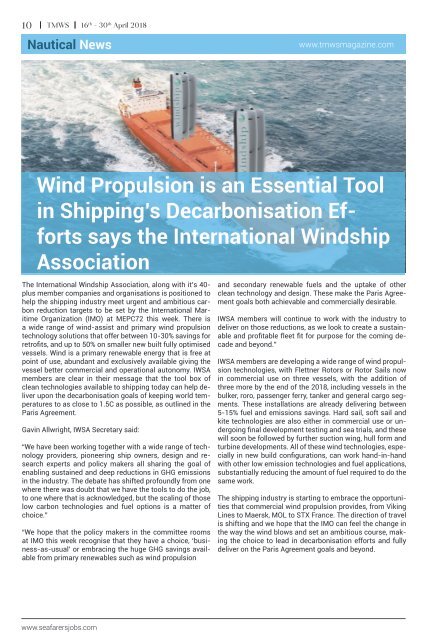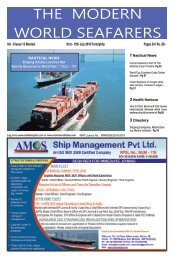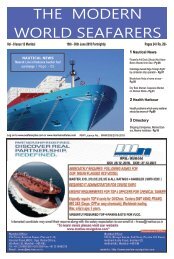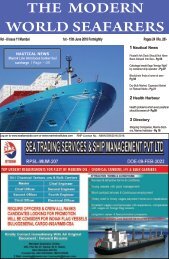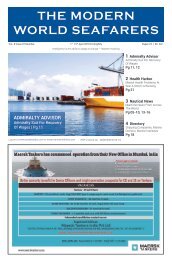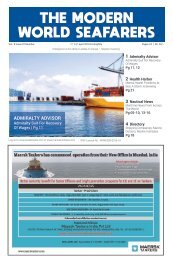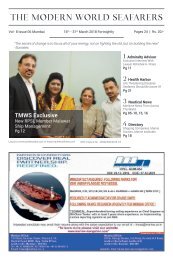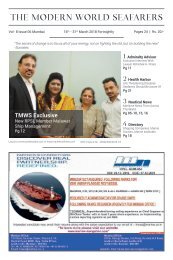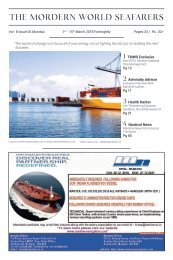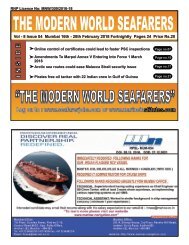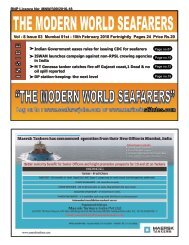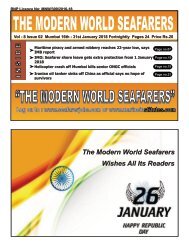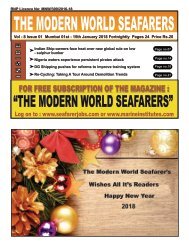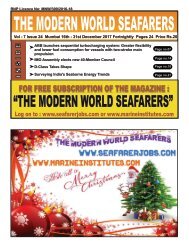You also want an ePaper? Increase the reach of your titles
YUMPU automatically turns print PDFs into web optimized ePapers that Google loves.
10 TMWS 16 th - 30 th April 2018<br />
Nautical News<br />
www.tmwsmagazine.com<br />
Wind Propulsion is an Essential Tool<br />
in Shipping’s Decarbonisation Efforts<br />
says the International Windship<br />
Association<br />
The International Windship Association, along with it’s 40-<br />
plus member companies and organisations is positioned to<br />
help the shipping industry meet urgent and ambitious carbon<br />
reduction targets to be set by the International Maritime<br />
Organization (IMO) at MEPC72 this week. There is<br />
a wide range of wind-assist and primary wind propulsion<br />
technology solutions that offer between 10-30% savings for<br />
retrofits, and up to 50% on smaller new built fully optimised<br />
vessels. Wind is a primary renewable energy that is free at<br />
point of use, abundant and exclusively available giving the<br />
vessel better commercial and operational autonomy. IWSA<br />
members are clear in their message that the tool box of<br />
clean technologies available to shipping today can help deliver<br />
upon the decarbonisation goals of keeping world temperatures<br />
to as close to 1.5C as possible, as outlined in the<br />
Paris Agreement.<br />
Gavin Allwright, IWSA Secretary said:<br />
“We have been working together with a wide range of technology<br />
providers, pioneering ship owners, design and research<br />
experts and policy makers all sharing the goal of<br />
enabling sustained and deep reductions in GHG emissions<br />
in the industry. The debate has shifted profoundly from one<br />
where there was doubt that we have the tools to do the job,<br />
to one where that is acknowledged, but the scaling of those<br />
low carbon technologies and fuel options is a matter of<br />
choice.”<br />
“We hope that the policy makers in the committee rooms<br />
at IMO this week recognise that they have a choice, ‘business-as-usual’<br />
or embracing the huge GHG savings available<br />
from primary renewables such as wind propulsion<br />
and secondary renewable fuels and the uptake of other<br />
clean technology and design. These make the Paris Agreement<br />
goals both achievable and commercially desirable.<br />
IWSA members will continue to work with the industry to<br />
deliver on those reductions, as we look to create a sustainable<br />
and profitable fleet fit for purpose for the coming decade<br />
and beyond.”<br />
IWSA members are developing a wide range of wind propulsion<br />
technologies, with Flettner Rotors or Rotor Sails now<br />
in commercial use on three vessels, with the addition of<br />
three more by the end of the 2018, including vessels in the<br />
bulker, roro, passenger ferry, tanker and general cargo segments.<br />
These installations are already delivering between<br />
5-15% fuel and emissions savings. Hard sail, soft sail and<br />
kite technologies are also either in commercial use or undergoing<br />
final development testing and sea trials, and these<br />
will soon be followed by further suction wing, hull form and<br />
turbine developments. All of these wind technologies, especially<br />
in new build configurations, can work hand-in-hand<br />
with other low emission technologies and fuel applications,<br />
substantially reducing the amount of fuel required to do the<br />
same work.<br />
The shipping industry is starting to embrace the opportunities<br />
that commercial wind propulsion provides, from Viking<br />
Lines to Maersk, MOL to STX France. The direction of travel<br />
is shifting and we hope that the IMO can feel the change in<br />
the way the wind blows and set an ambitious course, making<br />
the choice to lead in decarbonisation efforts and fully<br />
deliver on the Paris Agreement goals and beyond.<br />
www.seafarersjobs.com


